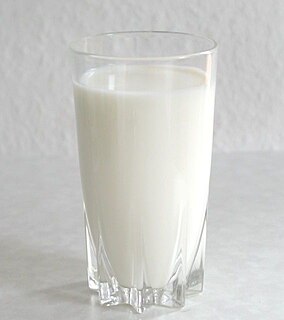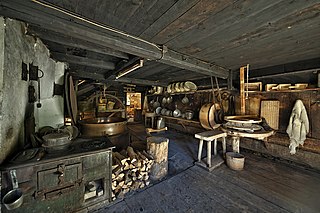
A dairy is a business enterprise established for the harvesting or processing of animal milk – mostly from cows or goats, but also from buffaloes, sheep, horses, or camels – for human consumption. A dairy is typically located on a dedicated dairy farm or in a section of a multi-purpose farm that is concerned with the harvesting of milk.

Anand Milk Union Limited or Amul is an Indian dairy company, based at Anand in the state of Gujarat.

Verghese Kurien, known as the 'Father of the White Revolution' in India, was a social entrepreneur whose "billion-litre idea", Operation Flood, the world's largest agricultural dairy development programme, made dairy farming India's largest self-sustaining industry and the largest rural employment provider, being a third of all rural income, with benefits of raising incomes and credit, riddance of debt dependence, nutrition, education, health, gender parity and empowerment, breakdown of caste barriers and grassroots democracy and leadership. It made India the world's largest milk producer from a milk-deficient nation, which doubled milk available per person and increased milk output four-fold, in 30 years.
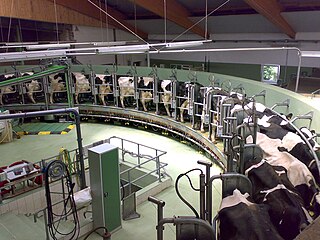
Dairy farming is a class of agriculture for long-term production of milk, which is processed for eventual sale of a dairy product.
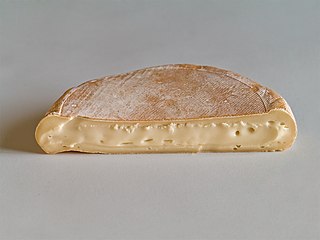
Reblochon is a soft washed-rind and smear-ripened French cheese made in the Alpine region of Savoy from raw cow's milk. It has its own AOC designation.

Dairy cattle are cattle cows bred for the ability to produce large quantities of milk, from which dairy products are made. Dairy cows generally are of the species Bos taurus.
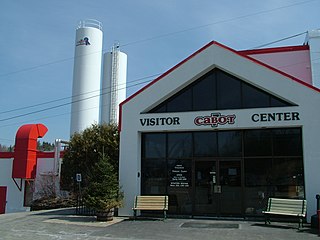
The Cabot Creamery Cooperative is an American dairy agricultural marketing cooperative, which is owned by local dairy farmers in New England and the Agri-Mark Cooperative company.
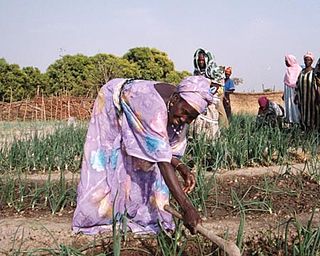
An agricultural cooperative, also known as a farmers' co-op, is a cooperative where farmers pool their resources in certain areas of activity. A broad typology of agricultural cooperatives distinguishes between 'agricultural service cooperatives', which provide various services to their individually farming members, and 'agricultural production cooperatives', where production resources are pooled and members farm jointly. Examples of agricultural production cooperatives include collective farms in former socialist countries, the kibbutzim in Israel, collectively governed community shared agriculture, Longo Mai co-operatives and Nicaraguan production co-operatives.

Operation Flood, launched in 1970, was a project of India's National Dairy Development Board (NDDB), which was the world's biggest dairy development program. It transformed India from a milk-deficient nation into the world's largest milk producer, surpassing the USA in 1998, with about 17 percent of global output in 2010–11. In 30 years it doubled milk available per person, and made dairy farming India’s largest self-sustainable rural employment generator. It was launched to help farmers direct their own development, placing control of the resources they create in their own hands. All this was achieved not merely by mass production, but by production by the masses; the process has been called the white revolution.

Dairy Farmers of America Inc. (DFA) is a national milk marketing cooperative in the United States. It is owned by and serves more than 14,500 dairy farmer-members representing more than 8,500 dairy farms in 48 states. DFA markets members' raw milk and sells milk and derivative products to wholesale buyers both domestically and abroad. Net sales in 2016 were $13.5 billion, representing about 22 percent of raw milk production in the United States.

The Kerala Cooperative Milk Marketing Federation (KCMMF) or Milma was registered as a cooperative society in 1980 with its head office in Thiruvananthapuram. It was brought under the Operation Flood programme of the National Dairy Development Board. KCMMF is a Federation of Regional three Regional Milk Unions, the ERCMPU, TRCMPU and MRCMPU. It follows a cooperative structure and one of the most profitable cooperatives in Kerala State. In 1983, it took over (absorbed) the production and milk marketing facilities under the Kerala Livestock and Milk Marketing Board. The board was later named to Kerala Livestock Development Board.

A large number of farmers in India depend on animal husbandry for their livelihood. In addition to supplying milk, meat, eggs,wool, their castings (dung) and hides, animals, mainly bullocks, are the major source of power for both farmers and drayers. Thus, animal husbandry plays an important role in the rural economy. The gross value of output from this sector was ₹358 billion (US$5.0 billion) in FY 1989, an amount that constituted about 25 percent of the total agricultural output of ₹1.4 trillion (US$19.5 billion).

The Dairy and Tobacco Adjustment Act of 1983 is a United States federal law.
In the United States, the Dairy Price Support Program is the federal government program that maintains a minimum farm price for milk used in the manufacture of dairy products. It is one of many agricultural support programs. Under the dairy program, the United States Department of Agriculture (USDA) indirectly assures a minimum price for milk by purchasing any cheddar cheese, nonfat dry milk, and butter offered to it by dairy processors at stated prices. These purchase prices are set high enough to enable dairy processors to pay farmers at least the support price for the milk they use in manufacturing these products.
The Dairy Promotion Program or National Dairy Checkoff is a US commodity checkoff program for dairy product promotion, research, and nutrition education as part of a comprehensive strategy to increase human consumption of milk and dairy products and to reduce dairy surpluses.

The Northeast Interstate Dairy Compact was an agreement among the six New England states to support the farm price of milk at a higher level than under federally mandated minimum prices in the region.
Milk Income Loss Contract (MILC) Payments is the name given by USDA to the dairy farmer counter-cyclical payments program, authorized by the 2002 farm bill. Under the program, dairy farmers nationwide are eligible for a federal payment whenever the minimum monthly market price for farm milk used for fluid consumption in Boston falls below $16.94/cwt. A producer potentially can receive a payment equal to 45 percent of the difference between the $16.94 per cwt. target price and the market price, in any month that the Boston market price falls below $16.94. A producer can receive a payment on all milk production during that month, but no payments will be made on any annual production in excess of 2.4 million pounds per dairy operation. On average this limit is reached by a milking herd of 130 cows. MILC payments apply to production beginning December 1, 2002 through September 30, 2012.
The Fluid Milk Promotion Act of 1990 the designation given to Subtitle H of Title XIX of the Food, Agriculture, Conservation, and Trade Act of 1990. Subtitle H authorized the establishment of a national fluid milk processor promotion program, or commodity checkoff program for fluid milk promotion. The program is funded through a 20¢/cwt. assessment on all milk processed for fluid consumption.

Dairy farming in New Zealand began from small beginnings during the early days of colonisation by Europeans. The New Zealand dairy industry is based almost exclusively on cattle, with a total population of 4.8 million milking cows as of 2017. The income from dairy farming is now a major part of the New Zealand economy, becoming an NZ$13.4 billion industry by 2017.
A herdshare is a contractual arrangement between a farmer and an owner of livestock - the shareholder or member - through which the shareholder is able to obtain raw milk, meat, offal and other profits of the livestock proportionate to the shareholder's interest in the herd. Herdshares include cowshares, goatshares, and sheepshares, and are sometime referred to as "farmshares" or "dairy-shares," although the term "farmshare" can also refer to an entire farm held in joint ownership.

